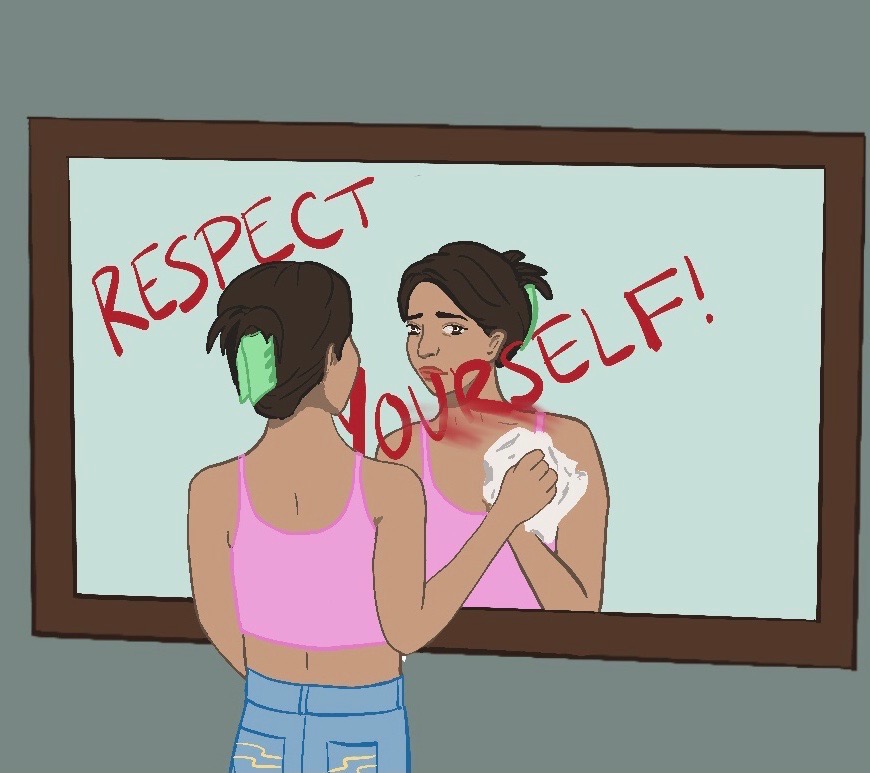I am not a slut
September 20, 2022
Content warning: sexual assault.
“She’s easy, anyone could get with her.”
A little birdie told me someone made that comment about me at a party.
At first, I laughed off the comment and turned it into a joke. I kept smiling and did my best to keep my head up. I know who I am and I know what I do. This wasn’t going to knock me or the confidence I worked so hard to build.
But slowly the remark crept back into my mind.
And it took me back to a place I’d rather forget.
Twenty-six point four percent of female undergraduate college students experience rape or sexual assault, according to the Rape, Abuse and Incest National Network, the nation’s largest anti-sexual violence organization.
Like many college-aged woman, my experiences with sex and relationships haven’t always been consensual.
The entirety of my first year of college revolved around learning to cope with being sexually assaulted. It was a year filled with self-hatred, sadness, anger, trauma and pain.
I cried myself to sleep and woke up with tears in my eyes. I wore the same dirty sweatpants and t-shirt. I barely consumed enough calories to function.
My whole world felt like it shattered in front of my face but I didn’t even understand why. It took me well over a month to realize what had actually happened to me.
After a month of unexplained sadness, I told the story to some friends, expecting it to be a silly and lighthearted anecdote from my life. However, at that moment a lightbulb turned on.
I finally realized what happened to me was assault.
I broke down in tears that night and remember violently screaming, “why did he do that? Why did I let him do that?”
Flash-forward two years later and the words “she’s easy, anyone could get with her,” make their way back to me.
So then I have to replay it all over again.
Was what happened to me all my fault? Was I asking for it? Did I deserve what happened to me?
Then I do the math in my head.
Is the way I’m acting now just going to get me assaulted again? Are the outfits I wear too provocative? Do I flirt too much? When people look at me, do they think I’m easy?
Then I think about how painful it was last time.
Will I have to experience the fallout of being assaulted again? Will I push everyone away? Will I stop eating? Will I even make it out of the darkness this time?
And then I cry.
I cry because I’m still not over what happened and I cry because I shouldn’t be judged for how I act, how I dress or what I do with my body.
Now I’m a victim of a different grievance: slut-shaming.
Slut-shaming is a form of bullying, usually targeted at girls, that degrades and humiliates sexuality, according to a Sept. 2 article from VeryWellFamily.
Slut-shaming contributes to a culture of victim-blaming.
In a study conducted by the University of Texas at Austin, out of 129 undergraduate women who had been sexually assaulted, 62% had engaged in self-blame, meaning they blamed themselves for their assault, according to an August 2015 article from the Journal of Interpersonal Violence.
Blaming yourself for what happened to you is a common response to being assaulted.
I spent too many hours of my life blaming myself for what happened to me. Hearing other people slut-shame me just fuels the fire of anxiety and pain.
I begin to question everything I did over and over again.
Another issue with slut-shaming is that it insinuates having multiple sexual partners is bad or dirty.
The act strips bodily autonomy from women. Other people are not at liberty to comment on how someone else uses their body.
UVM is ranked as the fourth most liberal university in the country, according to Niche, a college ranking website.
In theory, UVM is a progressive place where women should feel free to express their sexuality in whatever way they deem appropriate.
However, there is still a culture at UVM that perpetuates slut-shaming.
Even the UVM administration has made it clear they are not on the side of the survivor after repeatedly encouraging survivors of sexual violence to stay silent and engaging in victim blaming.
I wish I could sit here and write a happy ending to this story. I spent hours trying to.
The truth is, there are still days where I blame myself for what happened to me. I crawl under my covers and sob, wishing that I could go back in time and change it all.
At the end of the day, there is no way to reverse the clock. All I can hope for is that women use their words to uplift one another instead of putting each other down.
I don’t have it all figured out, but the fact that I am even writing this is a huge step in my healing journey.
My body is my own. I am learning how to love myself. What happened was not my fault. And I am not a slut.
